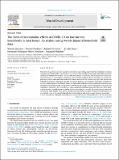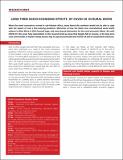| dc.contributor.author | Janssens, Wendy | |
| dc.contributor.author | Pradhan, Menno | |
| dc.contributor.author | de Groot, Richard | |
| dc.contributor.author | Sidze, Estelle | |
| dc.contributor.author | Donfouet, Hermann Pythagore Pierre | |
| dc.contributor.author | Abajobir, Amanuel | |
| dc.date.accessioned | 2022-01-20T12:33:25Z | |
| dc.date.available | 2022-01-20T12:33:25Z | |
| dc.date.issued | 2020-11-25 | |
| dc.identifier.citation | Wendy Janssens, Menno Pradhan, Richard de Groot, Estelle Sidze, Hermann Pythagore Pierre Donfouet, Amanuel Abajobir, The short-term economic effects of COVID-19 on low-income households in rural Kenya: An analysis using weekly financial household data, World Development, Volume 138, 2021, 105280, ISSN 0305-750X, https://doi.org/10.1016/j.worlddev.2020.105280. | en_US |
| dc.identifier.issn | 0305-750X | |
| dc.identifier.other | https://doi.org/10.1016/j.worlddev.2020.105280 | |
| dc.identifier.uri | https://repository.amref.ac.ke/handle/123456789/511 | |
| dc.description | This is an open access article under the CC BY-NC-NDlicense
(http://creativecommons.org/licenses/by-nc-nd/4.0/). | en_US |
| dc.description.abstract | This research assesses how low-income households in rural Kenya coped with the immediate economic
consequences of the COVID-19 pandemic. It uses granular financial data from weekly household interviews
covering six weeks before the first casewas detected in Kenya to five weeks after during which various containment
measureswere implemented. Based on household-level fixed-effects regressions, our results suggest
that income from work decreased with almost one-third and income from gifts and remittances
reduced by more than one-third after the start of the pandemic. Nevertheless, household expenditures
on food remained at pre-COVID levels.Wedo not find evidence that households coped with reduced income
through increased borrowing, selling assets or withdrawing savings. Instead, they gave out less gifts and
remittances themselves, lent less money to others and postponed loan repayments. Moreover, they significantly
reduced expenditures on schooling and transportation, in line with the school closures and travel
restrictions. Thus, despite their affected livelihoods, households managed to keep food expenditures at
par, but this came at the cost of reduced informal risk-sharing and social support between households. | en_US |
| dc.description.sponsorship | Health Insurance Fund, Amref Health Africa and PharmAccess Amsterdam through the i-PUSH programme (National Postcode Lottery) and the Joep Lange Institute | en_US |
| dc.language.iso | en | en_US |
| dc.publisher | Elsevier | en_US |
| dc.subject | COVID-19 pandemic | en_US |
| dc.subject | Economic effects | en_US |
| dc.subject | Fixed-effects regressions | en_US |
| dc.subject | Risk-coping | en_US |
| dc.subject | East Africa | en_US |
| dc.subject | Kenya | en_US |
| dc.title | The Short-Term Economic Effects of Covid-19 on Low-income Households in Rural Kenya: An Analysis Using Weekly Financial Household Data | en_US |
| dc.type | Article, Journal | en_US |


